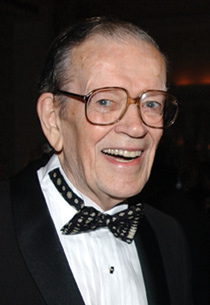BY ANN FARMER
 (Photo Credit: DGA Archives)
(Photo Credit: DGA Archives)
One evening in 1958 the phone rang in the Manhattan apartment of television director Tom Donovan who was then president of the Radio and Television Directors Guild. The voice on the other end said, “Hello, is this Tom? This is Frank Capra.”
Donovan thought it was a prankster—why would the legendary director, whom he idolized, be calling him? So Donovan replied, “Okay. Who is it?” In fact, it was indeed Capra, who invited Donovan to meet him and two other Hollywood directors at the 21 Club. “Because,” explained Capra, who was a board member of the Screen Directors Guild, “we’d like to talk about you guys in television and us guys in film getting together.”
“I said, ‘Wouldn’t that be wonderful,’” recalled Donovan. The New York-based Radio Directors Guild had been founded in 1942 and added TV directors in 1948. Donovan choked up as he described what set everything into motion for the RTDG and the SDG to consolidate to form the Directors Guild of America. “As far as I’m concerned,” says Donovan, “that’s how it started.”
With his support, when the RTDG members finally voted, “it was a pushover,” says Donovan. “It was certainly in our advantage,” he said, describing how he signed over the last RTDG check to the DGA. “It was for $50. That’s all we had.” He served on the first DGA board, and for 30 years continued to play a major role in the Guild.
Donovan launched his own career on Broadway, where he began as a stage manager before CBS hired him with a guarantee of one day of work a week for $20 per day. When they bumped him up to five days with a weekly salary of $60 to $80, it was with the caveat “that you could not accept another Broadway show. You have to be available for us,” says Donovan, who was spurred to get more involved with the RTDG, where he served three terms as president.
Eventually becoming an associate director and director at CBS, Donovan left after nine years to direct live dramas for such shows as Playhouse 90 and The United States Steel Hour. “I had a few turkeys, but most of the stuff I was pretty proud of,” says Donovan, who directed such theatrical luminaries as Alfred Lunt and Lynn Fontanne. Later, he directed and produced numerous soap operas, including General Hospital.
Donovan’s service on the newly formed National Board of the DGA began in 1960 and continued for 33 years, ending in 1993. He held most every position on the National Board during that time including board alternate, board member, assistant secretary, 3rd vice president, 1st vice president and national vice president. As vice president, he regularly consulted with the president on Guild matters and attended negotiations. Even when he wasn’t a member of the negotiating team, he’d attend as an advisor. Sitting behind his team, but on the back of his seat to boost his physical presence, he’d listen carefully, sometimes clearing his throat as a signal for how to vote. “I took an even, gentle approach to negotiations,” says Donovan. “But they knew I was there, in my quiet way, always fighting for the DGA.”
One of his proudest accomplishments was getting the Low Budget Agreement passed in the mid-’80s, which allowed directors to accept reduced salaries in order to work on low-budget projects. “That was a big step,” he says, noting that it had become a real need with the emergence of more independently produced films.
For his years of service, Donovan was made an Honorary Life Member in 1985 and received the Robert B. Aldrich Award in 2001. He’s also a trustee of the DGA and the Actors Fund of America, which operates the Lillian Booth Actors’ Home in New Jersey, where he and his wife have retired. When asked why he dedicated so much of himself to the Guild, he says, “It’s something I fell in love with.”